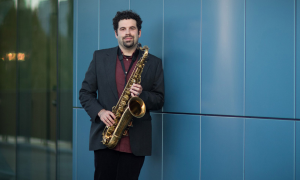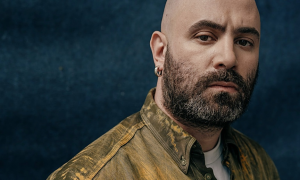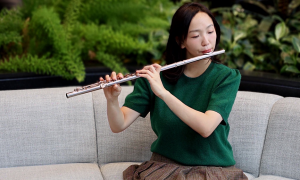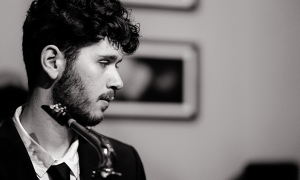Home » Jazz Articles » Take Five With... » Take Five With Bassist / Composer Yosef Gutman Levitt
Take Five With Bassist / Composer Yosef Gutman Levitt

Meet Yosef Gutman
Yosef Gutman Levitt, born in 1979 in South Africa, grew up on a farm in Knoppieslaagte. His musical journey began with piano lessons, which he later abandoned for skateboarding. At 16, inspired by the work of Jaco Pastorius, he picked up the bass guitar. He earned a scholarship to Berklee College of Music in Boston, where he honed his skills and collaborated with notable musicians like Lionel Loueke.After graduating magna cum laude, Yosef moved to New York to pursue a jazz career, performing with renowned artists such as Ben Monder. Despite the challenges, he continued to grow musically. In 2009, he relocated to Jerusalem, focusing on his technology venture, Mad Mimi, which was acquired by GoDaddy in 2014.
Returning to music in 2018, Yosef has since released several albums, incorporating traditional Hasidic melodies with jazz and global influences. He plays a custom 5-string acoustic bass guitar and lives in Jerusalem with his wife and eight children, dedicated to his music and community.
Instruments:
I play an acoustic bass guitar made by Luthier Harvey Citron. I often play it tuned up a fourth in order to capture sparkle in the higher register.Teachers and/or influences?
My formative years were greatly influenced by simple but wonderful African jazz masters like Winston Mankuku Ngozi and other local players in the Johannesburg area where I drew early influence from. As I began to develop, I drew guidance and inspiration from the educator Hal Crook, and my musical inspirations have always been Steve Swallow, Gary Peacock, Jack DeJohnette, Mick Goodrick, John Lockwood, Bill Frisell, Ralph Towner. And, perhaps most of all, my colleagues and friends with whom I played in my formative years, like Lionel Loueke in particular.I knew I wanted to be a musician when...
I knew I wanted to be a musician when I was 16 years old, in the middle of a large oil painting, and I remember considering adopting an art form with more instant gratification. It almost didn't matter what instrument I would choose, from a technical standpoint. However, I'm always looking for gaps to fill, to be useful, and I felt at the time that piano and guitar were instruments that were popular, and the market for such musicians was saturated. At least that was my perspective. So I chose the bass, where I could offer a supportive role. I soon realized how fun the bass was in African music particularly. However, not having a natural disposition to the big-bodied groove playing, my style being a little more buoyant and flighty, I think that's when I realized I wanted to be a musician on the instrument as opposed to a bassist.Your sound and approach to music.
I have always been trying to thin out the bass sound as an instrument in order to capture timbres of wood and air. For many years, I attempted to do this on solid body electric instruments which brought me to some degree to a unique sound. I pluck the strings from underneath rather than on top at a diagonal, which is a common performance technique that gives me a certain resonance that I feel like I can play with. I also tend to be drawn to upper register playing and melodic creative playing. I also tend to stay away from riffs or elements of particular vocabularies like one finds in jazz or blues. The music I make is also highly influenced by the simple Jewish melodies of the spiritual masters of the last, say, 400 years. They have a particular knack for simple melodies that have surprising poise. I feel like attaching myself to that dimension of musicality while on the surface it might seem somewhat banal forces me to pay attention to the stories I tell and the melodies that I play.Your teaching approach
When teaching students, I start with color. Using tonalities and scales as colors, and offering students ideas as to where these colors can belong. I tend to stick with improvisation as a language, and most importantly, space, which I think is the biggest challenge for many artists, including myself, is where to leave space, how to hear a melody, and how to execute at least some of it at the right place and at the right time.Your dream band
I think I'm blessed to have made more than one album already with my dream band, playing with Omri Mor and Ofri Nehemya, playing with Lionel Loueke and Gilad Hekselman. And not to forget my sidekick, Gilad Ronen, who offers me striking musicality, sharp ears, and production excellence in everything I do, not to mention assisting me fully in developing the melodies that I write or improvise. In the future, I would love very much to play with people outside of the jazz space, exploring different cultures and different worldviews in music. That's not to say that the people in the jazz space are homogenous in any way, I just would like to continue the journey.Road story: Your best or worst experience
Being that most of my musical time is spent recording and creating, I don't have any amazing touring stories right now.Favorite venue
My favorite venue is my recording studio in Jerusalem, where I record my catalog and the projects that I've been doing recently. The acoustics are wonderful, the environment is calm and open, so I would say that is my favorite venue.Your favorite recording in your discography and why?
Each recording in my catalog is really a snapshot of unique musical moments. I have a soft spot for the duet album Tal Yasis, spelled T-A-L-Y-A-S-I-S, with the wonderful New York guitarist Tal Yahalom. Whereas my recent album, Y10, has creative sparkle and surprise and mastery and balance that Gilad Hekselman really invoked and gifted to the recording. The album Upside Down Mountain has a certain South African innocence and creativity to it with its muted coloring. And because all of the albums are recorded live, each one has its own unique magic that takes me to a different place, to a different journey, when I listen.What do you think is the most important thing you are contributing musically?
I think what I am trying to contribute is a dimension of modesty in music. A clear attention to melody and modesty in order to convey the beauty of the inner dimension of simple pure melody, particularly those composed by Jewish Hasidic masters. I think there is a striking message there that the world is thirsty for. It is not a religious message, but it is a message that in an age where lines are blurred in almost every aspect of our lives, the gift of musical modesty is something very refreshing and freeing. And for one, I feel it helps me express myself.Did you know...
I was a professional skateboarder.The first jazz album I bought was:
Weather Report, Heavy WeatherMusic you are listening to now:
Yonathan Avishai: RetrovaillesFabiano do Nascimento: YKYTU
Desert Island picks:
Yonathan Avishai: Retrovailles Fabiano do Nascimento: YKYTUHow would you describe the state of jazz today?
I think it's an open space of creative opportunity!What are some of the essential requirements to keep jazz alive and growing?
Collaborations among artists from different worlds and cultures.What is in the near future?
Lots and lots more music! Later this year I'm grateful for the opportunities to release a striking classical-chamber orchestral album together with Itay Sher, an Argentinian-Israeli guitarist of exceptional ability, and a project with Yonathan Avishai. Also, a neo-classical-crossover project with Peter Broderick, known for his work on Erased Tapes Records.What is your greatest fear when you perform?
Perhaps the fear of not connecting with the audience.What song would you like played at your funeral?
In Jewish culture, after leaving this world, close members of the family don't listen or play music for a whole year! It's intense but it accentuates the loss and what better way to honor a funeral than to play the song of silence!?What is your favorite song to whistle or sing in the shower?
The song that isn't quite written yet! It's a great time to come up with new melodic seeds!By Day:
By day I try to participate in local opportunities to be helpful to my community along with recording and creating and marketing my creative output.If I weren't a jazz musician, I would be a:
Whatever would make my wife happy.If I could have dinner with anyone from history, who would it be and why?
King David—he was fearless!If I could go back in time and relive an experience, what would it be?
I would relive opportunities I missed and on that round, I'd try to make good.What's the song or piece of music you wish you could hear again for the first time?
Everything! Every song. In fact, this is a fantastic way of hearing music—really listening to everything and appreciating the things we know as if it's our first time experiencing them.Tags
Take Five With...
Yosef Gutman Levitt
AAJ Staff
Jaco Pastorius
Lionel Loueke
Ben Monder
Steve Swallow
Gary Peacock
Jack DeJohnette
Mick Goodrick
John Lockwood
Bill Frisell
Ralph Towner
Omri Mor
Ofri Nehemya
Gilad Hekselman
Tal Yahalom
Weather Report
PREVIOUS / NEXT
Support All About Jazz
 All About Jazz has been a pillar of jazz since 1995, championing it as an art form and, more importantly, supporting the musicians who make it. Our enduring commitment has made "AAJ" one of the most culturally important websites of its kind, read by hundreds of thousands of fans, musicians and industry figures every month.
All About Jazz has been a pillar of jazz since 1995, championing it as an art form and, more importantly, supporting the musicians who make it. Our enduring commitment has made "AAJ" one of the most culturally important websites of its kind, read by hundreds of thousands of fans, musicians and industry figures every month.
























